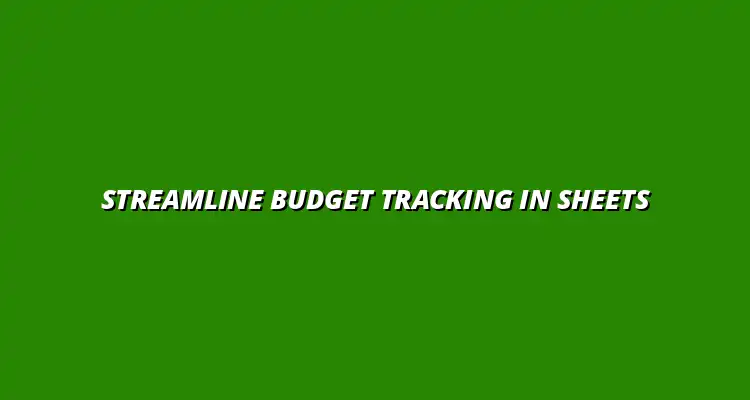
- Workflow Tips
- Jan 06
2025-01-06
In today’s fast-paced world, managing finances can often feel overwhelming. Automating budget tracking is a game changer! It allows you to keep a close eye on your spending without having to constantly update spreadsheets manually.
By implementing automation, you can not only save time but also gain more accurate insights into your financial habits. This shift from traditional methods to automated solutions simplifies the entire budgeting process, making it more efficient than ever. A great starting point is using a simple Google Sheets budget template to get organized.
Automation significantly alters the landscape of budget management. With the right tools, you can set up systems that do the heavy lifting for you. This means that instead of spending hours compiling data, you'll receive real-time updates and insights at your fingertips!
Here are some ways automation enhances budget management:
Technology plays a crucial role in how we manage our finances today. With tools like automated budget trackers, you can make informed decisions quickly. This technology allows anyone to become more financially savvy without needing a finance degree! To fully leverage the power of Google Sheets, check out these discover Google Sheets hidden tips.
Using tech in personal finance has led to:
Google Sheets is an excellent tool for automating your budget tracking. It's accessible, free, and packed with features tailored for finance management. Plus, its cloud-based nature means you can access your budget from anywhere! Learn how to streamline data management with sheets for optimal efficiency.
Some of the main benefits include:
Google Sheets isn’t just a basic spreadsheet; it’s a powerful tool that comes with a variety of features ideal for budgeting. These features allow you to automate tasks that would otherwise take up valuable time. Let’s dive into what makes Google Sheets such an effective budgeting solution!
Here are some standout features for budgeting:
One of the greatest strengths of Google Sheets is its customizable templates. You can find templates designed specifically for budgeting or create your own with just a few clicks! This flexibility means your budget can evolve as your financial needs change. Automating data entry can free up significant time; discover how to automate Google Sheets data entry.
Moreover, you can utilize built-in functions to automate tasks, such as:
Google Sheets allows you to add extra features through various add-ons. These integrations can boost your budget tracking experience, turning an already great tool into something even more powerful! There are many options available, from financial calculators to third-party budgeting tools. For a comprehensive guide on automation, see this guide on how to automate Google Sheets.
Consider some popular add-ons:
When it comes to automated budget tracking using Google Sheets, it’s natural to have questions. Understanding the security and limitations of this approach can help you make informed decisions about managing your finances. Let's dive into some of the most common inquiries regarding budget tracking automation!
Many users wonder about the safety of their sensitive financial information when using Google Sheets. It’s crucial to have clarity on this topic since our financial data is often personal and private. By addressing these concerns, you can feel more confident about using automated tools for budgeting. Efficient workflows are essential; learn to streamline processes with Google Sheets.
Your financial data's security is a top priority when using Google Sheets for budgeting. Google implements a range of security measures to protect your information, and understanding these features can ease your worries. It's always better to be informed about how your data is managed and safeguarded.
Some key security measures include:
Google's security measures are designed to establish trust and protect users. They often conduct rigorous audits and assessments to ensure robust security protocols are in place. Additionally, Google provides transparency on its security practices, allowing you to stay informed about how your data is handled.
Here are some tips to further ensure the safety of your financial information:
To maintain the integrity of your automated budget tracker, following best practices is essential. By incorporating these strategies, you can minimize risks and enhance your budgeting experience. Here are a few suggestions.
While Google Sheets offers many advantages for budgeting, there are some limitations that users may encounter. Identifying these challenges can help you navigate the budgeting process more effectively. Let's explore some of these limitations to better understand how to optimize your use of Google Sheets. Effective task management is key; explore tips on how to manage tasks effectively with sheets.
Some common challenges include:
Many users find that while Google Sheets is a powerful budgeting tool, it might not cover all their needs. The learning curve for complex formulas can sometimes be steep. Addressing these challenges will help you use Google Sheets to its fullest potential.
Here are some common challenges and potential solutions:
If you find that Google Sheets does not fully meet your budgeting needs, there are alternatives worth considering. Many budgeting tools and software options offer specialized features that might aid in your financial management. Exploring these options can help you find the perfect fit for your individual budget tracking style.
Some popular alternatives include:
To get the most out of your budget tracking experience, regular maintenance is key. By setting aside time to review and update your tracker, you can ensure it remains an effective financial tool. Let's discuss some strategies to keep your Google Sheets budget tracker running smoothly!
When you maintain your tracker, you're not just keeping it tidy; you're also making sure it's relevant to your current financial situation. Implementing a routine review process can help you stay on top of your finances and make necessary adjustments.
Scheduling regular updates for your budget tracker can significantly enhance its effectiveness. Whether you choose to review your budget weekly or monthly, having a set schedule helps keep your financial goals on track. This proactive approach will help you respond to any changes in your financial landscape.
Here’s how you might structure your review process:
By committing to a regular review schedule, you can quickly identify trends and adjust your spending habits. Whether you prefer a weekly or monthly review, consistency is key! Try setting reminders in your calendar to ensure you don’t skip these important check-ins.
During your reviews, consider these aspects:
As your financial situation evolves, adjusting your budget categories is essential. This ensures your budget reflects your current priorities and lifestyle. Additionally, forecasting future expenses can help you prepare for significant costs ahead!
To effectively adjust your categories, consider:
Continuous improvement is vital for effective budget tracking! Utilizing resources can provide you with helpful tips and insights to refine your financial management skills. Whether you prefer reading blogs, participating in communities, or enrolling in courses, there are many ways to enhance your budgeting experience.
Some valuable resources include:
Engaging with communities and educational resources can provide you with invaluable insights. Each platform offers unique perspectives on budgeting, helping you discover new techniques and strategies. By participating in these resources, you can continue to grow your financial knowledge!
Here are some specific recommendations:
One of the most exciting aspects of Google Sheets is its capability for customization! You can find numerous templates designed for budgeting, making it easier to track your financial progress. Additionally, leveraging scripts can automate tasks, saving you time in the long run.
Consider exploring:
Automating your budget tracking with Google Sheets can simplify personal finance management tremendously! By embracing technology, you’ll find it easier to monitor your financial health and make informed decisions. As you keep refining your budget tracker, you’re taking positive steps toward achieving your financial goals.
Consistency is key when it comes to adapting your budget tracker. The more you use it, the more comfortable you'll become with the process, and the better your financial management will be! Remember, your budget is a living document that should evolve as your financial situation changes.
The goal of automation is to make financial management smoother and less time-consuming. By utilizing Google Sheets effectively, you can create a budgeting system that works for you. With the right setup and regular updates, you can easily monitor and adjust your finances!
As your financial situation changes, don’t hesitate to adapt your budgeting strategies. Automation is a tool that should serve your unique needs, allowing you to focus on what truly matters. Your budget can empower you to make better financial decisions!
Finally, I invite you to commit to consistently using your budget tracker. Celebrate your financial wins, no matter how small, and adjust your goals along the way. As you actively engage in your financial journey, you’ll gain valuable insights and become more financially savvy!
Embracing the automated budgeting process will empower you to take control of your finances. The journey may have ups and downs, but with the right tools and mindset, you can conquer your financial goals.
Your experiences and insights are incredibly valuable! I encourage you to share how you’ve utilized Google Sheets for your budgeting needs. Engaging with others can foster a supportive community where we can all learn and grow together.
Join the conversation! Share your tips, ask questions, and connect with fellow budgeting enthusiasts. Let’s create a space where we can all improve our financial management skills and achieve our goals. Every step counts, and together we can make a difference!
